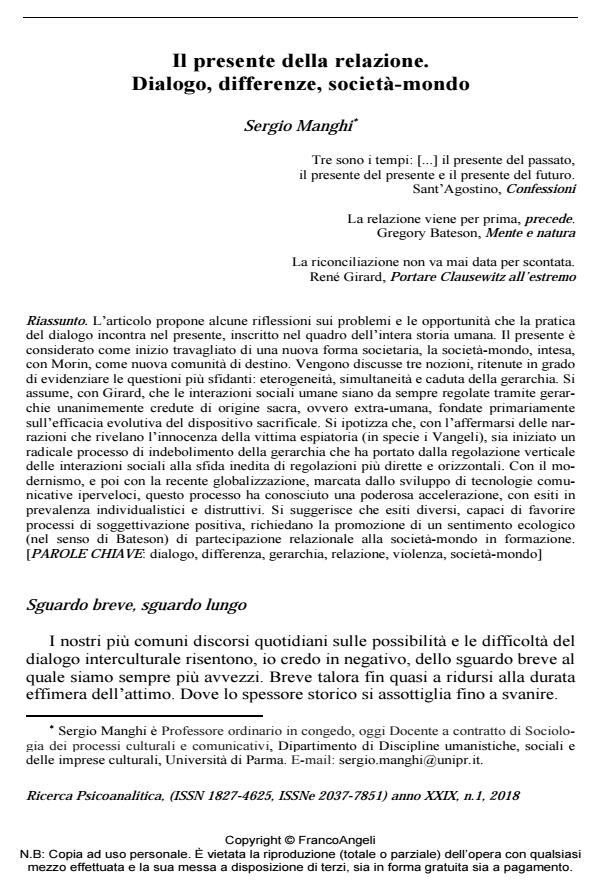The present of relationships. Dialogue, differences, world-society.
Journal title RICERCA PSICOANALITICA
Author/s Sergio Manghi
Publishing Year 2018 Issue 2018/1 Language Italian
Pages 20 P. 63-82 File size 211 KB
DOI 10.3280/RPR2018-001006
DOI is like a bar code for intellectual property: to have more infomation
click here
Below, you can see the article first page
If you want to buy this article in PDF format, you can do it, following the instructions to buy download credits

FrancoAngeli is member of Publishers International Linking Association, Inc (PILA), a not-for-profit association which run the CrossRef service enabling links to and from online scholarly content.
The article offers some reflections on the problems and opportunities that the practice of dialogue encounters in present times, inscribed within the whole human history. These times are considered to be the troubled beginning of a new societal form, the world-society, understood, with Morin, as a new community of destiny. Three notions are discussed, which are considered able to highlight the most challenging questions: heterogeneity, simultaneity and fall of the hierarchy. It is assumed, with Girard, that human social interactions have al-ways been ruled by hierarchies unanimously believed as sacred, to say extra-human, primarily based on the evolutionary efficacy of the sacrificial device. It is hypothesized that with the affirmation of the narratives that reveal the innocence of the expiatory victim (especially the Gospels), a radical weakening of the hierarchy has begun which has led from the vertical regulation of social interactions to the unprecedented challenge of more direct and horizontal regulations. With modernism and then with the recent globalization marked by the development of hyper-speedy communication technologies, this process has experienced a dramatic acceleration, with predominantly individualistic and destructive results. It is suggested that different outcomes, capable of favoring positive processes of subjectivation, require the promotion of an ecological feeling (in the sense of Bateson) of relational participation in the beginning world-society.
Keywords: Dialogue, difference, hierarchy, relationships, violence, world-society
- Atlan H. (1986). À tort et à raison : intercritique de la science et du mythe. Paris: Le Seuil.
- Bateson G. (1972). Steps to an Ecology of Mind. New York: Ballantine Books (trad. it.: Verso un’ecologia della mente. Milano: Adelphi, 2000).
- Bateson G. (1979). Mind and Nature: A Necessary Unity. New York: Dutton (trad. it: Mente e natura. Un’unità necessaria. Milano: Adelphi, 1984).
- Bauman Z. (2000). Liquid Modernity. Cambridge: Polity Press (trad. it.: La società individualizzata. Bologna: il Mulino, 2002).
- Bauman Z. (2001). The individualized society. Cambridge: Polity Press (trad. it.: La società individualizzata. Bologna: il Mulino, 2002).
- Boltanski L., Chiappello È. (1999). Le nouvel esprit du Capitalisme. Paris: Gallimard (trad. it.: Il nuovo spirito del Capitalismo. Milano: Mimesis, 2014).
- Cavalli-Sforza L.L. (1997). Genes, Peoples, and Languages. Proceedings of National Academy of Science USA, 94(15): 7719-7724.
- Cavalli Sforza L.L. (2004). L’evoluzione della cultura. Proposte concrete per studi futuri. Torino: Codice Edizioni.
- Débord G. (1967). La société du spectacle. Paris: Buchet-Chastel (trad. it.: La società dello spettacolo. Milano: Baldini e Castoldi Dalai, 2008).
- Dumont L. (1967). Homo hyerarchicus. Essai sur le système des castes. Paris: Gallimard (trad. it.: Homo hyerarchicus. Saggio sul sistema delle caste. Milano: Adelphi, 1993).
- Dupuy J.P. (2008). La Marque du sacré. Paris: Flammarion.
- Durkheim E. (1893). De la division du travail social. Paris: Félix Alcan (trad. it.: La divisione del lavoro sociale. Roma-Ivrea: Edizioni di Comunità, 1989).
- Elias N. (1987). Die Gesellschaft der Individuen. Frankfurt am Main: Suhrkamp Verlag (trad. it.: La società degli individui. Bologna: il Mulino, 1990).
- Eliot T.S. (1943). Four Quartets. New York: Harcourt, Brace and Company (trad. it: Quattro quartetti. Milano: Garzanti, 1976).
- Foucault M. (1975). Surveiller et punir. Naissance de la prison. Paris: Gallimard (trad. it.: Sorvegliare e punire. Nascita della prigione. Torino: Einaudi, 1976).
- Fressoz J.B. (2012). L’apocalypse joyeuse. Une histoire du risque technologique, Paris: Le Seuil.
- Freud S. (1913). Totem e Tabù. In Opere di Sigmund Freud. Vol. VII. Torino: Bollati Boringhieri.
- Girard R. (1972). La violence et le sacré. Paris: Grasset (trad. it:. La violenza e il sacro. Milano: Adelphi,1980).
- Girard R. (1978). Des choses cachées depuis la fondation du monde, Grasset, Paris (trad. it.: Delle cose nascoste sin dalla fondazione del mondo, Adelphi, Milano, 1982).
- Girard R. (2007). Achever Clausewitz. Conversation avec Bernard Chantre. Paris: Carnets Nord (trad. it.: Portando Clausewitz all’estremo. Milano: Adelphi, 2008).
- Johanson D. (2001). Origins of Modern Humans: Multiregional or Out of Africa?. Ac-tionBioscience (American Insti-tute of Biological Sciences). Testo disponibile al sito: http://www.actionbioscience.org/evolution/johanson.html.
- Latour B. (1991). Nous n’avons jamais été modernes. Essai d’anthropologie symétrique. Paris: La Découverte (trad. it.: Non siamo mai stati moderni. Saggio di antropologia simmetrica. Milano: Elèuthera, 1995).
- Latour B. (2017). Où atterrir?. Paris: La Découverte.
- Magatti M. (2009). Libertà immaginaria. Le illusioni del capitalismo tecno-nichilista. Milano: Feltrinelli.
- Manghi S. (2004). La conoscenza ecologica. Attualità di Gregory Bateson. Milano: Raffaello Cortina.
- Manghi S. (2009). Il soggetto ecologico di Edgar Morin. Verso una società-mondo. Gardolo (TN): Erickson.
- Morin E. (2001). La Méthode. 5: L’identité humaine. Paris: Le Seuil (trad. it.: Il metodo. 5: L’identità umana. Milano: Raffaello Cortina, 2002).
- Morin E., Kern A.B. (1993). Terre-Patrie. Paris: Le Seuil (trad. it.: Terra-Patria. Milano: Raffaello Cortina, 1994).
- Pearce B. (1989). Communication and the Human Condition. Carbondale and Edwardsville: Southern Illinois University Press (trad. it.: Comunicazione e condizione umana. Milano: FrancoAngeli, 1993).
- Pievani T. (2012). Homo sapiens. Il cammino dell’umanità. Novara: De Agostini.
- Sollers Ph. (1978). La lettre volée de l’Évangile (Réponses à des questions de Catherine Francblin). Art Press International, 19: 6-8.
- Stiegler B. (2016). Dans la disruption, Comment ne pas devenir fous?. Paris: LLL – Les Liens qui Libèrent.
- Toynbee, A.J. (1976). Mankind and Mother Earth. London: Oxford University Press (trad. it.: Il racconto dell’Uomo. Milano: Garzanti, 1987).
Sergio Manghi, Il presente della relazione. Dialogo, differenze, società-mondo in "RICERCA PSICOANALITICA" 1/2018, pp 63-82, DOI: 10.3280/RPR2018-001006